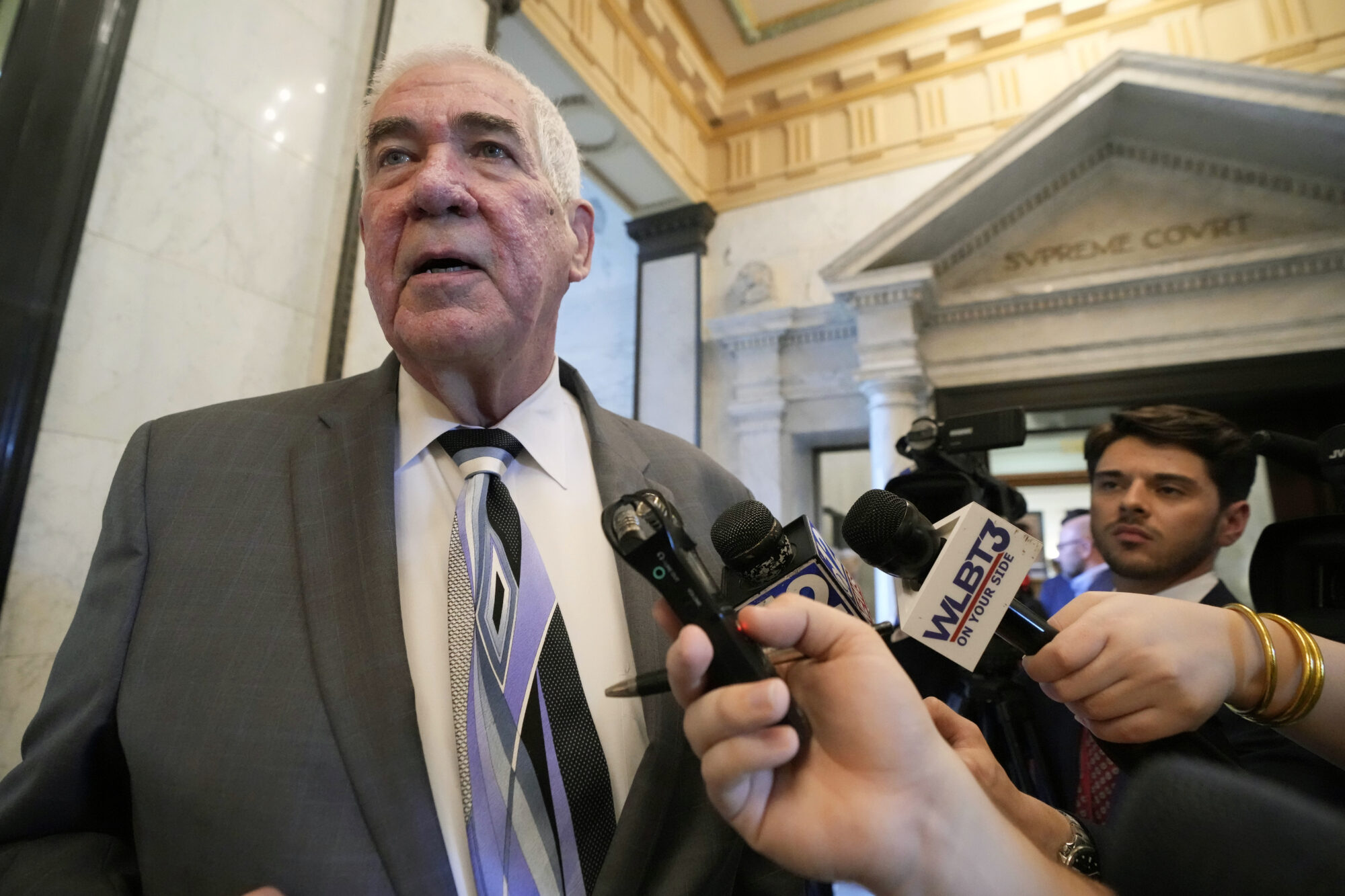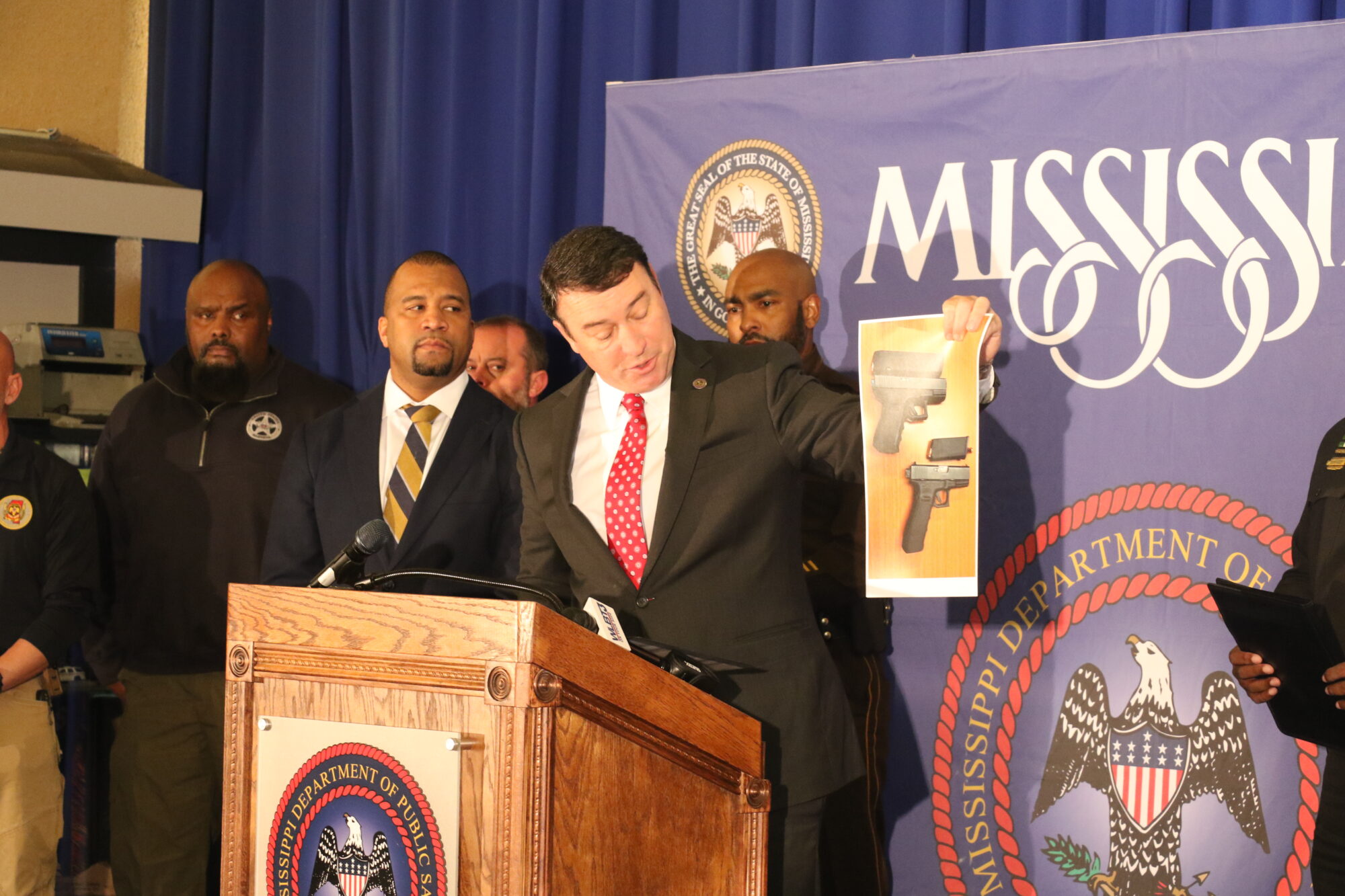
Mississippi State Senate Medicaid Committee Chairman Kevin Blackwell, R-Southaven, answers questions from reporters on a proposal to expand Medicaid benefits to tens of thousands of residents, during its meeting, Wednesday, March 27, 2024, in the Mississippi State Capitol. The Senate proposal would cover fewer people than the House version. (AP Photo/Rogelio V. Solis)
- The Senate plan, which supporters say is more conservative than the House’s option, was adopted on Thursday by a 36-16 vote.
The Mississippi Senate has moved forward with a plan for Medicaid expansion that hinges on CMS approving a work requirement waiver for no less than 120 hours per month, or 30 hours a week.
After two hours of debate, the Senate inserted their Medicaid committee substitute into the House bill and passed it by vote of 36 to 16.
State Representative Missy McGee (R), author of the original House bill, said she was pleased to see the legislation still alive and planned to invite conference to continue working on the issue.
The Senate language was inserted as a strike-all into the original House bill which did call for a CMS waiver but allowed for expansion to occur up to the 138% of the Federal Poverty Level (FPL) regardless of the approval of a waiver, essentially providing for full Medicaid expansion.
The new language also caps the expansion at 100% of the FPL, which is roughly $15,000 for an individual and $31,000 for a family of four.

“We had a vote today on helping the working people of Mississippi,” said Lt. Governor Delbert Hosemann (R) after the passage of the bill. “If we as a society believe we should have individuals who are working stay in the workforce, pick up our labor force participation rate, we needed to do what Senator Blackwell and the Senate did today.”
Hosemann said the Senate plan was a conservative amendment. While he respected the opinions of all members on the floor today and appreciated the debate, he said this was a step forward for Mississippi in helping each other.
“The focus needed to be on people, on the individuals in our state that are trying to make it by working. That is what this is about,” said Hosemann.
State Senator Kevin Blackwell (R), Chairman of the Senate Medicaid Committee, brought the bill to the floor and began his presentation of the legislation by acknowledging that people will have their opinions on the bill, but that becomes a problem with they assume their opinions are fact.
“I have been on record as opposing Obamacare Medicaid expansion. And I still am. So, when the Lt. Governor asked me to work on healthcare reform I had a little heartache,” said Blackwell on the floor. “After many hours of meetings with the Hospital Association, Department of Health, Medicaid, the Department of Insurance, representatives from our managed care health plans, we have the bill in front of us.”
Blackwell reiterated his belief that the Senate version was a responsible and conservative bill geared toward helping the “working poor.”
Blackwell said his continued opposition to traditional expansion is because it could limit the provider pool. The exchange plans provide roughly 40% higher compensation rates to healthcare providers than does Medicaid. It also allows a larger variety of access to providers that are otherwise limited by Medicaid acceptance.
“It makes no sense to move approximately 140,000 to 150,000 people off the exchange and on to Medicaid with the subsidies offered by the federal government,” said Blackwell.
The debate on the Senate floor was more robust than the House expansion plan, which came out almost unanimously with no questions or amendments.
RELATED: Mississippi Senate unveils Medicaid expansion plan
The first amendments offered by Democratic lawmakers would have implemented traditional expansion, reduced the 30-hour work requirement to 20 hours, and required review to happen twice a year instead of quarterly. None were adopted on the floor.
Republican Senator Joey Fillingane also offered an amendment to take out the portions which would allow one parent or primary caregivers of a child under 6, or someone diagnosed by a doctor as physically, mentally, or intellectually disabled, to be exempt from the work requirement.
In conversation on the floor, Fillingane indicated he was concerned physicians would begin signing off on these ailments for individuals that are not in line with what is considered “not able bodied,” creating a niche in the law. He likened the issue to jury shopping.
State Senator Nicole Boyd (R) argued that this amendment would make critically ill individuals ineligible for coverage. While they are eligible for Social Security coverage, she said the federal government is telling people that it could be upwards of 6 months before they receive those benefits.
Senator Blackwell asked members to vote against Fillingane’s amendment, and it failed on the floor.
Speculation remains on whether CMS will approve a work requirement waiver request. Beginning in 2018 under the Trump administration, 13 states attempted to have work requirement waivers approved to provide Medicaid in coverage gap areas. Approvals were made but reversed by courts in all but Georgia. It has been widely speculated that the Biden administration will reject work requirements.

Chairman Joey Fillingane, R-Sumrall
“What are we even doing here,” said Senator Fillingane speaking on the bill. “The Biden administration has been crystal clear that they are not going to accept work requirements.”
Fillingane said the intent of Medicaid is to provide healthcare, not help individuals find work. For other states who have seen the overturning of work requirements, it is because those requirements are outside of the intent of Medicaid as a program.
Fillingane said an exception for Mississippi is not going to be accepted under the current administration.
“So, what have you done, made yourself feel better?” asked Fillingane to the body.
He did compliment his chamber on the debate they had on the legislation, clearly poking at lack of debate on the House floor surrounding their expansion plan.
State Senator John Horhn (D) reiterated in his remarks that he did not like the bill, but appreciated the efforts being made on the issue. He urged lawmakers to listen to their constituents and what they need.
“If you talk to people who are working hard and still can’t pay for healthcare, they’ll say this is a good bill,” said Horhn. “In a bipartisan spirit I think we should approve this bill and continue to improve it as we go forward.”
State Senator Brice Wiggins (R) said the bill is just “another waiver,” something Mississippi has utilized over and over, for different areas of need.
Wiggins, who formerly served as Medicaid Chair under then-Lt. Governor Tate Reeves, and said at the time he was also not in support of Medicaid expansion. However, Wiggins said when he started hearing from doctors that expansion is needed, he started listening.
“I’m telling you from every doctor they’re saying it is the right thing to do for this population,” said Wiggins. “These white coats didn’t go into medical school just to make money. We’ve got to do something to help.”
Senator Wiggins said unless the state is prepared to raise reimbursement rates, this is one way they can help the “working poor.” He commended Chairman Blackwell on his work with this waiver, and acknowledged the bill would likely be headed to conference.
Governor Tate Reeves (R) has been outspoken in his opposition to Medicaid expansion efforts. The Governor does have veto power over the bill. However, in the event a veto is handed down, the bill could return to the Legislature where lawmakers would have the chance to attempt to override the veto by a two-thirds vote in both chambers.










